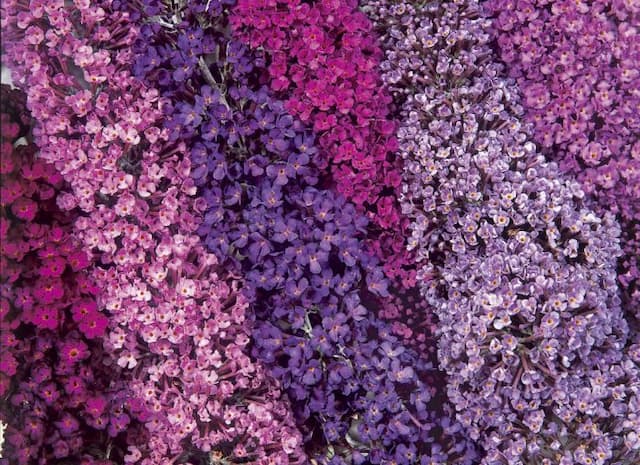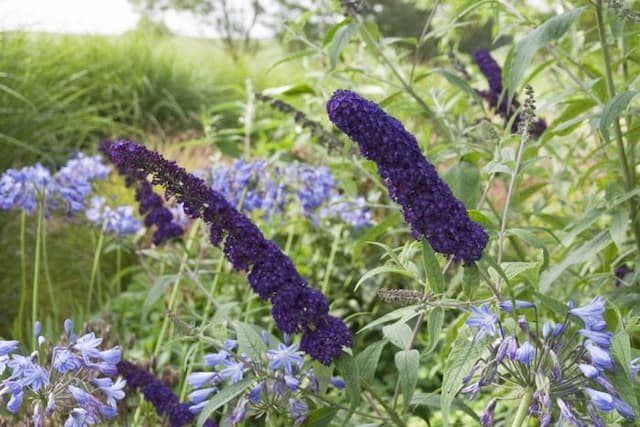Mullein Verbascum 'Caribbean Crush'

ABOUT
Verbascum 'Caribbean Crush' is known for its striking appearance characterized by its vibrant flowers and lush foliage. The flowers have a captivating gradient of colors, blending from peach to soft yellows, and often accented with deeper orange at the center. The petals are soft and delicate, with a rounded shape, resembling little cups or bells clustered together on erect flower spikes. This creates a striking visual contrast against the green backdrop of the plant's foliage. The leaves of 'Caribbean Crush' are equally appealing, with a soft, velvety texture that is pleasant to the touch. These leaves are large and somewhat rounded, with a grayish-green hue that complements the warm tones of the flowers nicely. They form a rosette near the base of the plant, lending a full and robust presence that underpins the towering blooms. Overall, Verbascum 'Caribbean Crush' exudes a tropical vibe with its lush, vibrant blooms that are reminiscent of the warm tones found in Caribbean sunsets. This plant is a favorite among gardeners who wish to add a splash of color and an exotic feel to their garden spaces without discussing its dimensions.
About this plant
 Names
NamesFamily
Scrophulariaceae
Synonyms
Mullein, Velvet Plant
Common names
Verbascum 'Caribbean Crush'.
 Toxicity
ToxicityTo humans
Mullein, including the variety 'Caribbean Crush', is not known to be toxic to humans. Therefore, ingestion is not typically associated with serious symptoms of poisoning. However, as with all plants, individual allergies or sensitivities could cause mild irritation or an allergic reaction in some people.
To pets
Mullein, including the 'Caribbean Crush' variety, is generally considered non-toxic to pets. It is unlikely to cause serious harm if ingested by animals such as dogs or cats. As with humans, some pets may have an individual sensitivity leading to mild gastrointestinal upset, but severe toxicity is not expected.
 Characteristics
CharacteristicsLife cycle
Perennials
Foliage type
Semi-deciduous
Color of leaves
Green
Flower color
Mixed
Height
3 feet [91 cm]
Spread
2 feet [61 cm]
Plant type
Herb
Hardiness zones
5
Native area
Mediterranean
Benefits
 General Benefits
General Benefits- Attracts Pollinators: Provides nectar and pollen for bees, butterflies, and other beneficial insects.
- Drought Tolerant: Once established, it has low water requirements, making it suitable for xeriscaping.
- Low Maintenance: Requires minimal care beyond the initial planting and occasional watering.
- Colorful Blooms: Offers vibrant flowers that add visual interest to garden spaces.
- Long Blooming Season: Produces flowers for an extended period, often throughout the summer.
- Deer Resistant: Less likely to be eaten by deer, which can benefit gardeners in rural areas.
- Suitable for Containers: Can be grown in pots, which is ideal for balconies or small spaces.
- Improves Biodiversity: Supports a diverse range of insects, which can enhance ecological health.
 Medical Properties
Medical PropertiesThis plant is not used for medical purposes.
 Air-purifying Qualities
Air-purifying QualitiesThis plant is not specifically known for air purifying qualities.
 Other Uses
Other Uses- Verbascum 'Caribbean Crush', also referred to as Mullein, can be used as a natural dye for fabrics, imparting a range of colors from yellow to green depending on the mordant used.
- The dried stalks of Mullein can be dipped in wax or fat to create makeshift torches or candles, which were traditionally used by Roman soldiers.
- The soft leaves have been historically used as insulation material in footwear to keep feet warm during cold seasons.
- Mullein can act as a natural fish poison; when thrown into a pond, the saponins released can temporarily incapacitate fish without causing them lasting harm.
- In companion planting, Mullein can attract beneficial insects like lacewings, ladybugs, and pollinators, which help in the biological control of pests.
- The plant can be used to make a decoction for darkening hair naturally, by simply rinsing hair with the water infused with the Mullein flowers.
- Mullein flowers provide a source of subtle flavoring and coloring when used in making homemade cheeses or other dairy products.
- The stalks, being sturdy and long, can be repurposed as plant stakes or structures in the garden to support other plants.
- When camping, the leaves can be used as a natural, biodegradable toilet paper alternative due to their size and softness.
- As a fibrous plant, Mullein has been experimented with for use in creating rough, hand-spun yarns and subsequently, woven textiles.
Interesting Facts
 Feng Shui
Feng ShuiThe Mullein is not used in Feng Shui practice.
 Zodiac Sign Compitability
Zodiac Sign CompitabilityThe Mullein is not used in astrology practice.
 Plant Symbolism
Plant Symbolism- Healing: Verbascum plants, commonly known as Mullein, have been used for centuries in traditional herbal medicine to treat respiratory ailments, suggesting a symbolism of healing and relief.
- Protection: Folklore often cites Mullein as a plant that wards off evil spirits and bad luck, thus it symbolizes protection.
- Courage: Due to its sturdy and resilient nature, Mullein can be seen as a symbol of courage and the ability to withstand tough conditions.
- Love: In some traditions, Mullein is associated with the goddess Aphrodite/Venus, thereby linking the plant to love and beauty.
 Water
WaterMullein 'Caribbean Crush' should be watered deeply whenever the soil feels dry to the touch at a depth of about an inch, which typically means watering about once a week during the growing season. Depending on weather conditions, like heat and wind, you might need to water more frequently. A general rule is to provide about 1 gallon of water to fully saturate the soil around the plant, but adjust the amount based on the plant's size and the soil's moisture level. During winter or in cooler weather, reduce watering frequency as the plant requires less moisture.
 Light
LightMullein 'Caribbean Crush' thrives best in full sun conditions. It should be placed in a location where it receives at least six hours of direct sunlight each day. The plant will perform well and produce the most flowers when it is exposed to unfiltered sunlight for the majority of the day.
 Temperature
TemperatureMullein 'Caribbean Crush' is hardy and can withstand temperatures as low as 20 degrees Fahrenheit, but should not be exposed to prolonged periods of extreme cold. Its ideal growing temperatures range between 60 and 70 degrees Fahrenheit. During hot summers, the plant can survive in temperatures up to 80 degrees Fahrenheit without issue.
 Pruning
PruningPrune Mullein 'Caribbean Crush' to remove spent flower spikes and encourage a second bloom. Deadheading the plant after the initial flowering can also promote a tidier appearance. It is best to prune mullein plants in the late summer or early fall once they have finished their blooming period.
 Cleaning
CleaningAs needed
 Soil
SoilVerbascum 'Caribbean Crush', commonly known as mullein, thrives in well-draining soil with plenty of organic matter. A suitable mix would be one part peat, one part perlite or sand, and two parts garden soil. Mullein prefers a slightly acidic to neutral pH, around 6.4 to 6.8.
 Repotting
RepottingMullein should be repotted every two to three years to refresh the soil and accommodate root growth. Spring is typically the best time for repotting this plant.
 Humidity & Misting
Humidity & MistingMullein enjoys a low to moderate humidity level. As a Mediterranean native, it is used to drier conditions and does not require high humidity to thrive.
 Suitable locations
Suitable locationsIndoor
Position in bright, indirect light and keep soil well-drained.
Outdoor
Plant in sunny spot with space for its tall spikes.
Hardiness zone
5-9 USDA.
 Life cycle
Life cycleThe 'Caribbean Crush' Mullein begins its life cycle when a seed germinates, typically in early spring, when the soil is moist and temperatures start to rise. The seedling then develops into a rosette of leaves, staying close to the ground, often in its first year of growth. In its second year, the plant elongates to form a tall floral spike where buds form and bloom into vibrant, colorful flowers that attract pollinators. After flowering, which usually occurs from late spring to early fall, the plant sets seed, dispersing them into the surrounding area for future germination. The parent plant often dies after setting seed, completing its biennial life cycle. New seedlings from dispersed seeds will then start the cycle anew, establishing a potential colony of 'Caribbean Crush' Mullein plants in the area.
 Propogation
PropogationPropogation time
Late Spring - Early Summer
The Verbascum 'Caribbean Crush', commonly known as Mullein, can be propagated through seed. This is the most popular and straightforward method for this particular plant. To propagate Mullein by seed, the best time is in late winter or early spring, ahead of the growing season. The seeds require light to germinate, so they should be sown on the surface of a well-draining seed starting mix and not covered with soil. The containers with seeds should be kept in a warm place and maintained at approximately 70 degrees Fahrenheit (21 degrees Celsius) until germination, which usually takes about 2 to 3 weeks. Once the seedlings are large enough to handle, they can be transplanted into individual pots and later moved to their final location in the garden when the risk of frost has passed.


![Butterfly bush [Adonis Blue]](/_next/image?url=https%3A%2F%2Fplants-admin.emdemapps.com%2Fimages%2Fplants%2F%2Fimages%2F604b56e58f983.png&w=640&q=75)


![Butterfly bush [Buzz Ivory]](/_next/image?url=https%3A%2F%2Fplants-admin.emdemapps.com%2Fimages%2Fplants%2F%2Fimages%2F604b57987dfa8.png&w=640&q=75)
![Butterfly bush [Camberwell Beauty]](/_next/image?url=https%3A%2F%2Fplants-admin.emdemapps.com%2Fimages%2Fplants%2F%2Fimages%2F604b5ead04c12.png&w=640&q=75)


